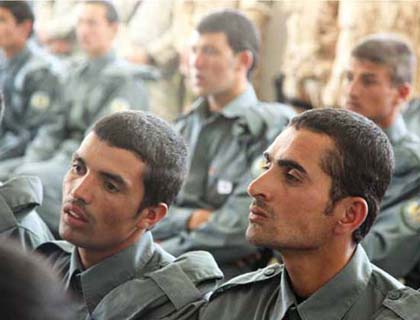KABUL - Eight in 10 Afghans do not believe their police force is ready to take charge of law and order, a United Nations report showed Tuesday, underscoring worries about the pace of transition to Afghan security control.
While many Afghans say they think crime has decreased, citizens are still worried about the reach of the Taliban insurgency, and many are alienated from the police, seeing them as drug-affected, corrupt or biased, the United Nations Development Program (UNDP) survey showed.
Foreign police advisers and soldiers, as well as conducting anti-insurgent operations, are training Afghan recruits and are already handing over security responsibility for some areas ahead of a 2014 deadline for the withdrawal of foreign forces.
"Looking to the future, two in 10 Afghans think the ANP is ready now to take over all policing responsibilities from international forces," the UNDP said in the 'Police Perception Survey 2011."
"Considerable work remains," the report concluded, pointing to the huge task still facing western advisers over the next three years as they try to build the skills and professionalism of the relatively newly formed Afghan National Police, or ANP.
"Despite some signs of improvement, corruption remains a significant concern; so do a range of other forms of police misconduct, including excessive physical force, drug-taking, perceived bias and disrespectful treatment."
More than a quarter of the 7,000-plus people surveyed said they or a household member had seen an ANP member using drugs -- an increase on 2010 -- while 18 percent said they or a household member had been asked for a bribe by a police officer.
Over half of those surveyed said they believed police were loyal to their clan -- in a country long splintered by tribal and ethnic rivalries -- and the majority thought filing a complaint against an officer would not help.
"Each of these raises the specter of alienation from the force," the UNDP said.
The UNDP report pointed to some encouraging improvements, include Afghan perceptions of how much crime was committed in their neighborhoods.
"Nearly half of Afghans say crime in their area has declined in the past year, up by 6 points from last year, and 52 percent say they live in a 'low crime' area," it said.
Still, ratings of security from violence generally, and from the Taliban in particular, had slipped in the past year, in what the UNDP admitted was a "troubling sign" for international forces working to counter the insurgency.
Additionally, seven in 10 Afghans said they were likelier to report a crime to a policewoman than they would to a male officer, even though only 53 percent thought it was a good idea to have female officers in their community.
Despite the presence of more than 100,000 foreign troops, violence across Afghanistan remains at its worst levels since the Taliban were toppled by U.S.-backed Afghan forces in late 2001, according to the United Nations.
The NATO-led International Security Assistance Force (ISAF) says levels of violence are falling, but its statistics do not include attacks on civilians. (Reuters)

